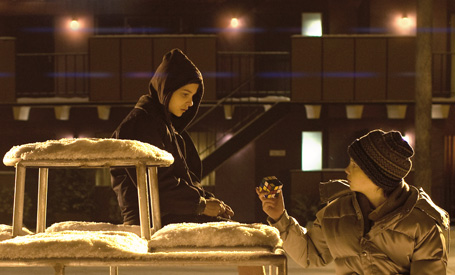
Still, holders of such snob logic will do well to give Let Me In a glance, for it is a case study in how even the same film, done with minor alterations and added scenes, and even the same scene, can produce a different effect if done from another solid, consistent perspective.
In Let Me In director Matt Reeves remakes the Swedish hit Let the Right One In, which told the story of a bullied boy, Owen, who befriends a strange, sad, lonely girl, Abby, next door. The twist being she turns out to be a vampire. Reeves successfully adapts a classic to address the concerns of his own, different society because he is able to differentiate between the concerns of his society and his audience and place the story firmly within them.
While many critics have praised the film’s anti-Twilight nature, I play devil’s advocate and say this film has in the scope of its thematic concerns more in common with Twilight than it dares to get credit for. Like Twilight, its concerns are all about being the best possible person one can be as dictated by one’s nature. Twilight’s monster protagonists are heroic because the extent of their self-denial in taking human life (and having premarital sex) have the purity of knights. For what other reason could it open with Ronald Reagan’s 1982 speech? The one in which, as the obvious inspiration to Glenn Beck, stirringly insists that America’s greatness stems from its goodness. It is this key thematic obsession, with that of goodness, that Reeves successfully defines his film by that differentiates it from its Swedish counterpart.
What was striking about Let the Right One In was not just its innovative treatment of the vampire story, but that it also depicts a working-class neighbourhood so miserable that vampirism is the least of horrors anyone can imagine in living there. Far from being about goodness, the film’s focus on the potential for evil was unrelenting. Evil is shown as something in which all have the capacity for, even in society’s victims, and even being mean and hard will not help you escape disproportionate retribution. The universe is cold and possibly amoral. Its palette was that of harsh grays and cold blacks. Excised from Let Me In a whole subplot involving several middle-aged to elderly nobodies who grumble over possible Russian invasions at the neighbourhood diner. If there is nothing more deadening to the soul than a perpetual state of fear, I have yet to find it.
If Reeves’ script and direction are a showcase in how a different focus and a different key emotional stress, can create a film with a different feeling, the performances in the film are equally up to the task. While Kare Hedebrant played Oskar (the original film’s version of Owen) in a low-key and enigmatic manner in the Swedish version that suggested both a cherubic innocence and the calm of a latent psychopath, Kodi Smit McPhee lends Owen an intelligence and seriousness that manifests itself behind his eyes. Lina Leandersson played Eli (the original film’s Abby) as a hardened character with the survival instincts and animalistic innocence of a predator, Chloe Moretz’s Abby is by turns innocent, nurturing, and inherently sad, even when she has to kill. Turning in two other strong performances are Richard Jenkins as Abby’s “Father”, her Renfield-like henchman who fetches her fresh kills, who suggests a world of vulnerability and tenderness with a single glance. Elias Koteas plays a cop, a character not in the original, here played as a tired man in over his head when faced with horrors beyond his comprehension. Most of the roles are played as basically good, decent and responsible people trying to do their best in a fallen world.
It is not to say that Reeves is not able to wring some genuine horror and tragedy out of this setup still, for Reeves understands that sometimes the best conflicts are not built out of good and evil, but of good on good. In one key scene that is perhaps the film’s best moment, Owen finds himself with a delicate moral dilemma where he has to choose between loyalty and compassion as virtues, and the decision that he makes is heart-wrenching and chilling at the same time. No one who sees the film will forget it.
The cinematographic palette of warm browns and moody blues lend the film a harsh yet strangely warm atmosphere, and Michael Giacchino’s score is alternatingly violent and tender to match.
Let Me In embodies the contradictory qualities of its heroine, it is a chilling modern vampire story, that is also in turns warm, sad and savage. It is a showcase in how there may be nothing new under the sun in terms of stories, but the marvel is in the subtleties of how each story is rendered.












 Printable Version
Printable Version










Reader's Comments
Be the first to leave a comment on this page!
Please log in to use this feature.